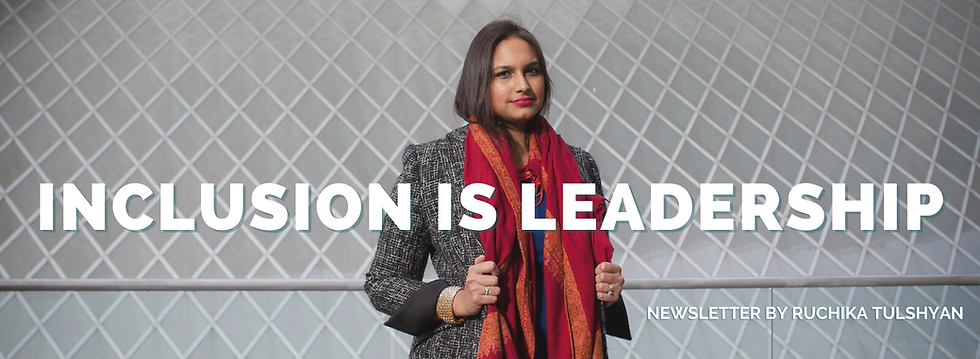Do You Agree With My Inclusion Prediction for 2022?
- Ruchika T. Malhotra
- Jan 25, 2022
- 3 min read

There’s a big gap — a chasm, even — between knowing that inclusion is a priority…
…and taking personal responsibility to drive it.
As the great Martin Luther King Jr. said,
“Our lives begin to end the day we become silent about things that matter.”
Yesterday was MLK Day in the United States and while many organizations and leaders use it as a day to post an obligatory inspiring quote by Dr. King and then go on conducting business as usual, I can’t help but feel more inspired than ever that this is the year for change.

Inclusive workplaces don’t happen by chance. We have to practice inclusion every day, like many meaningful endeavors such as playing an instrument or sport, and even cultivating relationships.
We don’t see many models of this practice in leadership.
Think about how many leaders pay lip service to inclusion, then a few months later a news story breaks about toxic work culture, microaggressions, or turnover at their organizations?
Cue MLK Jr. quote on any business leader’s social media.
But that’s no longer acceptable. It’s 2022, everyone. Empty words are so last year.
The buck for inclusion stops with every one of us — especially when we’re in positions of power and privilege.
Yes, I’m talking about leaders, but not just in the C-Suite. Leaders of departments, teams, Employee Resource Groups, volunteer organizations, and networking groups have power and privilege they can deploy to ensure people of all identities and backgrounds are welcome.
For too long, we’ve seen gridlock in progress towards work cultures where historically underestimated and underrepresented people can fully belong and contribute.
As one example, this number astonishes me: after nearly two years in a devastating global pandemic that exacerbated inequalities, over 13 million women left the workforce. Meanwhile, male employment resumed to pre-pandemic levels!
And that’s merely one dimension of diversity. When you add intersecting identities of race and ethnicity, socioeconomic class, immigration status, and more, the outcomes are even more grim.
There are plenty of actions leaders can take and I am more hopeful than ever that this is the year we’ll see inclusive leadership in action.
To that end, I have two predictions I’m making for 2022:
1. More leaders will embrace personal accountability — out loud
We’ll see more statements like “meritocracy is a myth and I recognize how structural biases and racism holds back many from career progress.” Or, “while talent is abundant, opportunity is not. I'm committing to create opportunities for historically excluded people in the workplace.”
Imagine, for a moment, the impact it would have on you to hear your organization’s leaders declare something like that? Imagine that if you’re from a historically underrepresented community, how much more welcome you’ll feel when leaders with privilege admit this?
I can’t wait to see this become the “new normal.”
But I want to say too that if you feel overwhelmed by the prospect of embracing your accountability and then, well, making a mistake, there’s nothing wrong with you — in fact, you’re in great company.
It’s easy to feel daunted by a challenge as all-encompassing as meaningful, sustainable inclusion. We’ve all been there, and we’ll likely be there again. The mindset shift we must make over and over is this: it’s not a matter of choosing the “best” or “right” course of action, but choosing AN action. I lay out more of these in my book, Inclusion on Purpose (which will be in your hands on March 1st!).
It has actionable advice for organizations and individuals alike.
I often have to remind myself that when it comes to progress, “perfect is the enemy of good.” Well, perfect action doesn’t exist, especially in imperfect situations and in the face of huge challenges like systemic racism and sexism.
But if we all take consistent, committed, “pretty good” action… what a world of difference we’ll make!
What are your inclusion predictions for 2022 and beyond?

.png)
Comments